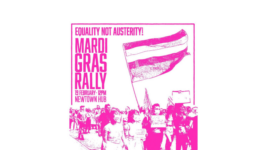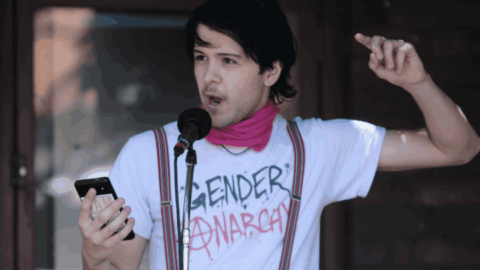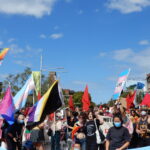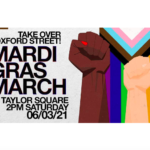Agitating Against Mardi Gras Corporatisation: An Interview With Pride in Protests’ Mikhael Burnard

In less than a fortnight, Sydney city will be awash with hundreds of thousands of people from across the globe, as WorldPride 2023 kicks off, with the Gay and Lesbian Mardi Gras incorporated into the international event this year.
So, while Pride in Protest is continuing its tradition of calling out Mardi Gras on its increasing corporatisation and inclusion of suspect institutions, like the NSW police, its rally in this regard will take an alternate route, marching up King Street at midday on 18th February to join with Fair Day.
In taking to the street this year, Pride in Protest is demonstrating against homophobia, transphobia, whorephobia and racism, which are prejudices that have been on the rise globally, especially with the bolstering and emboldenment the far-right was served as part of the fallout from the pandemic.
And with a NSW state election on the cards about a month after the rally, Pride in Protest is further highlighting that both the Liberals and Labor have done nothing to address the needs of the LGBTIQ community in their policy platforms.
Prejudice in law
The Australian state, 12 months ago, was on the verge of passing the Religious Discrimination Bill, which was legislation then PM Scott Morrison had spent his entire time in office fighting for and served to establish a series of laws that would have enshrined the right to religious bigotry in law.
Morrison’s religious freedoms crusade shares common ground with the rise of the far-right, with this broader campaign having determined that attacks upon transgender people are the best way to pushback against the LGBTIQ rights movement having been victorious in marriage equality.
Indeed, Morrison shelved his religious laws only when members of his own party sought to strike a deal, which would have seen discriminatory laws that permit LGBTQ students to be expelled from religious schools revoked in exchange for a guaranteed passage of the bill.
And rather than reject these laws outright, the Albanese government has said it will consider whether to pass reformed religious discrimination laws, and if it will allow laws permitting religious schools to turf out LGBTQ students, as well as queer teachers, to remain in operation.
Radical roots
Established in 2008, Pride in Protest is an LGBTIQ social justice group that’s bringing back the radical roots that underpinned the original 1978 Mardi Gras parade, which served to counter discriminatory laws of the time and was brutally attacked by officers from the NSW Police Force because of this.
And over its half decade of demonstrating, Pride in Protest has persistently attempted to see the police, Corrective Services NSW and the Liberals barred from the annual Mardi Gras event, while its anticorporate rallies have served as a focal point for this message.
Sydney Criminal Lawyers spoke to Pride in Protest spokesperson Mikhael Burnard about the Mardi Gras board blocking their anticorporate recommendations, the need to eradicate whorephobia in the community and the queer rights NSW political parties should be prioritising.

Mikhael, WorldPride is coming to Sydney this month, with Mardi Gras being incorporated into it. So, Pride in Protest is holding its annual anti-corporate rally in response on 19 February.
In terms of Pride in Protest’s anticorporate stance, does this translate to WorldPride? Are their aspects of this global celebration that need reforming?
We feel that WorldPride does broadly represent our anticorporate stance.
As you’re aware though, part of the WorldPride program in Sydney is a human rights conference, and in order to get in the building, the ticket prices for that event are in the hundreds of dollars.
We live in a country where trans and nonbinary people face high levels of unemployment and casualisation. Nonbinary people, as a gender demographic, have the highest rate of work casualisation in the country.
So, the sort of person who can afford to pay hundreds of dollars to get into an event like this, is not the type of person who has the same economic interests as other people in the community.
It’s going to be people who are comfortably wealthy or those working for a large NGO. They’re not going to be facing the same issues with employment and housing security as a lot of trans and nonbinary people are.
Additionally, WorldPride is contiguous with surrounding alliances and sponsorships with groups, like Qantas and American Express, which have discriminatory practices or participate in things like border control measures.
These policies and their participation aren’t just objectionable but are actively detrimental to the global and domestic queer community.
At the 2022 Mardi Gras annual general meeting, Pride in Protest sought to put a number of anticorporate motions to the vote, some of which were blocked.
Can you talk about the issues your organisation has with the way the Sydney event is currently being run?
All our motions were blocked, as Sydney Gay and Lesbian Mardi Gras pulled some political and legal bullshit, which, as it’s a registered charitable organisation, involves bylaws that mean the board is not required to hear motions not phrased in a particular way.
This meant that there was no real avenue for motions to be put forward and heard by the Mardi Gras board.
We find this distressing because it kills democracy within the Mardi Gras organisation, which is obviously a move to deflect criticism because of the community outrage around what it’s been doing in terms of enabling the participation of police and other problematic institutions in the event.
They don’t like being pulled up on this, so they’re killing that fire as it were.
Mardi Gras is continuing to work with the NSW police in accordance with the police accords. They claim they’re reforming those accords, but notably, the negotiations are happening behind closed doors, without any details being circulated to the Mardi Gras membership.
So, we have no way of actually knowing whether Mardi Gras is advocating for a particular set of interests, whether they’re standing by us or whether they’re bowing to police. We have no way of knowing because it’s going on behind closed doors and that’s problematic.
We find it quite problematic that Mardi Gras continues to engage with political parties, like the Liberals and Labor, which have explicitly antiqueer politics or have refused to condemn antiqueer politics.
The catchphrase accompanying the Mardi Gras rally this year is “equality not austerity”. Can you elaborate on the significance of this message?
Trans and nonbinary people, and other groups of queer people, face a great degree of poverty and discrimination, when it comes to employment and housing.
A disproportionate percentage of transgender people live below the poverty line and have to rely on government services.
We’re facing a cost-of-living crunch that’s not really a cost-of-living crisis because it’s more a cost-of-greed crisis.
Globally, what’s happening is companies are deliberately raising prices because they can get away with it, and they’re using inflation rhetoric in order to account for this pursuit of profit and greed.
The rest of us are being asked to tighten our belts, while the CEOs of these corporations are doing fine. Those CEOs are facing no real challenge to their way of life or their comfort. It’s just the rest of us who get fucked.
Trans and nonbinary people, as well as other groups of queer people, already have this clear economic disadvantage.
So, now this further economic harm is being inflicted upon this community as a whole, and it will make the lives of the LGBT people markedly worse.
With the NSW state election coming up in March, Pride in Protest is also calling out both the Liberals and Labor as their policy platforms don’t address the needs of queer workers. What would you like to see on their agendas in this regard?
First of all, we’d like to see an explicit disengagement with any form of religious discrimination bill or any bills for bigots that would allow discrimination in workplaces, housing and so on.
Labor has not explicitly ruled out legislation like this, which provides a licence for discrimination and is totally unacceptable.
Additionally, we would like to see transition leave for trans workers. If you’re a trans person and you want to undergo legal, social and medical transition, you have to take out sick days for that.
This is a problem because being trans is not an illness and what happens if a person burns out all their sick days trying to access legal, medical and social transition and then they actually get sick.
This is clearly not equitable. So, what we’re pitching is six weeks annual recurring leave, that is year after year, because transition is not just going to happen. It’s a process that takes place over a period of time, so one and done is not adequate.
In holding the rally, Pride in Protest is also demonstrating against various prejudicial behaviours, one of which is whorephobia.
Can you speak on the importance of addressing discrimination and bias towards sex workers in the community?
There are some states in Australia, like NSW, where sex work is decriminalised. We want to see nationwide decriminalisation of sex work, because it is work.
People get into sex work because of choice or economic circumstances. All workers sell their bodies to some extent.
Sex work is discriminated against on moral grounds. And it’s a profession where trans and queer people are overly represented. So, anti-sex work laws and practices disproportionately affect queer and trans people.
Decriminalisation of sex work and the eradication of discrimination against it will improve the conditions of the queer and trans community.
Sex workers are not currently protected under the Anti-Discrimination Act, which means if you’re a sex worker or you’re a former sex worker, it’s actually a basis on which you can be denied the ability to rent or buy a house or get a job.
That’s ridiculous as your past circumstances should not abrogate your present day needs and rights when it comes to that sort of thing.
And lastly, Mikhael, as the world’s eyes are going to be focused on Sydney in a few weeks’ time, what other issues, perhaps on a more global scale, do you consider it important are raised as a part of the debate around LGBTQ rights that ensues as part of WorldPride 2023?
Globally, transphobia, queerphobia and homophobia are the spear tip of a resurgent far-right.
We have seen recently in the US, Donald Trump releasing a whole host of actively genocidal rhetoric, not just regular transphobia, as he was arguing transition should be prevented in all cases.
This is essentially decategorising trans people as a type of human.
In the UK, the US and other parts of the world, we’re seeing anti-trans legislation being used as a cover to bring back homophobia and discrimination against women.
We’re seeing a resurgence of far-right elements able to carry out anti-women and anti-gay legislation having been swept into power through popular anxieties about trans and nonbinary people.
I’m of the opinion that the global queer community needs to actively defend queer and trans people, needs to challenge such rhetoric in political and social spaces and it needs to fight back against this transphobic and fascist creep.







